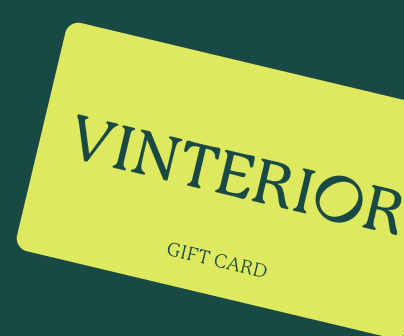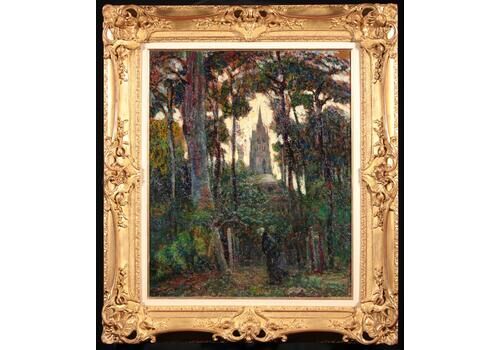Victor Charretonle Hameau En Ete Post Impressionist Landscape Oil Painting By Victor Charretonc.1930
£5,381 per item
Shopping at Vinterior
-
14-day return guarantee
-
Outstanding customer service
-
Secure payment
-
Buyer protection
-
Trees planted for every purchase

Item details
Height
36.2 cm
Width
54.61 cm
Depth
0.01 cm
Wear conditions
Good
Wear conditions
Excellent
Shows little to no signs of wear and tear.
Good
May show slight traces of use in keeping with age. Most vintage and antique items fit into this condition.
Average
Likely to show signs of some light scratching and ageing but still remains in a fair condition.
Apparent Wear and Tear
Visible signs of previous use including scratches, chips or stains.
Please refer to condition report, images or make a seller enquiry for additional information.
Description
Signed oil on panel landscape circa 1930 by French post impressionist painter Victor Charreton. This stunning work depicts a view of a French hamlet in summer - the buildings in the foreground and rolling green hills beyond.
Signature:
Signed with the artist's cachet lower left
Dimensions:
Framed: 14.25"x21.5"
Unframed: 8.25"x15.5"
Provenance:
Private French collection
Victor Charreton was the son of a surveyor. He spent his childhood in Chaumont and went to school in Bourgoin. In 1885 he began studying law at Grenoble University and in 1892 became a solicitor at the Lyons Court of Appeal. He had been painting since childhood and was given advice by Ernest Hareux (he did not merely read his treatise on painting, which was highly regarded at the time) and also later by Louis Japy. In 1902 he gave up his legal career to devote his time to painting. The same year he moved to Paris. Every summer, from 1912 onwards, he would spend time at his house in St-Amand-Tallende near Clermont-Ferrand, where his wife came from. He also travelled abroad: to Algeria in 1905, to Spain and England in 1912 and to Belgium and Holland in 1913, visiting numerous museums along the way. He also visited Corsica and Germany. He led the life of an aesthete and man of culture and was a lover of poetry and music. In 1914 he was made a Chevalier of the Légion d'Honneur.
Charreton was a landscape artist in the Lyons tradition with a love of sensual impasto. In his works he seeks to capture fleeting, momentary effects, like those achieved by the Impressionists: effects at different times of day and in different seasons, such as dusk and snow. As a young man he painted the environs of Bourgoin, but his marriage in 1893 took him to Auvergne where he painted the characteristic landscapes of the region. Landscapes of Auvergne make up approximately two-thirds of his output. What became known as the School of Murols, named after a village in Auvergne, was principally formed around him between 1910 and 1925. Skilled in capturing minute changes in the weather, he was also adept at capturing the spirit of new places. Beside his native Dauphiné and his adopted Auvergne, he was also charmed by the landscapes of the Île-de-France and Paris - Montmartre, the Jardin du Luxembourg and the Parc Montsouris - and also Provence, Creuse and Brittany. However, no trace has been found of his trips abroad. It would be a misjudgment to think that he only painted pretty picture-postcard scenes in the regions he visited; on the contrary, he would seek out the intimist qualities of a place, choosing perhaps a quiet hamlet, with a humble bridge over an anonymous stretch of water, or an ordinary tree outside a tumbledown house. He would paint blazing autumn landscapes, with a sumptuous colour palette, but also favoured snowy scenes, their exact chromatic opposite. At the start of his career he would paint dusky scenes and contre-jours in halftones and misty sunsets. As his artistic development progressed, he attached more and more importance to light and colour. In this respect his work follows on from that of Ravier and, like Guillaumin, it is almost a precursor to Fauvism, or alternatively can be regarded as complicit with it, like the work of Maurice Marinot. His brushwork evolved in tandem with his use of colour, which became ever more vibrant; for example his fondness for purple hues and later his striking colour contrasts. His brushwork became more conspicuous and he would suppress the insignificant details in order to bring out the forms that made up the general composition. Among art historians he is not ranked alongside the innovators who succeeded the Impressionists, like Gauguin, Seurat, Van Gogh or Cézanne. Older than Matisse, who was himself already by far the eldest of the Fauves, Charreton stopped short of what he considered to be their excesses. He placed himself at the crossroads between two centuries: the end of the century of Impressionism and the start of the leaps made by Fauvism. His life and the major themes in his work are evidence of this, but he decided to be a regional painter; as such, his talent and qualities are clearer than they may otherwise have been if he had chosen a more ambitious career. Beside his painting, he also wrote a play in three acts entitled The Montrouge Well ( Le Puits de Montrouge), which was performed in Bourgoin in December 1883.
Charreton made his debut at the Lyons Salon in 1894 with Morning in Montpeyroux. That same year he began exhibiting in Paris at the Salon of the Société des Artistes Français, showing October Evening. He was awarded an honourable mention in 1910, a silver medal in 1912, a gold medal in 1913 and a commendation outside the competition in 1914. He also became a member of the committee and the jury and exhibited there until his death. He took part in collective exhibitions in France - in Toulouse, Clermont-Ferrand, Roubaix and Bordeaux - and abroad, in New York, Geneva and Barcelona. In 1915 he held a solo exhibition at the Galerie Georges Petit in Paris. He exhibited in New York in 1916, 1920, 1921, 1924 and 1925; in Toledo in 1926 and 1934; Pittsburgh in 1933; Cleveland in 1934 and Japan in 1920 and 1928. In 1931 he inaugurated the Musée de Bourgoin by donating around 20 works; the museum then changed its name to the Musée Victor Charreton. He was also one of the founders and general secretary of the Salon d'Automne. In 1972 the Musée de Montmartre organised a posthumous retrospective exhibition of his work; in 1987 and 1989 two more were held in a Paris gallery; then in 2003 the Musée de Bourgoin-Jallieu (in Isère) held in exhibition entitled Victor Charreton: The Public Collections ( Victor Charreton. Les Collections Publiques).
Museum and Gallery Holdings:
Albi (Mus. Toulouse-Lautrec)
Bourgoin-Jallieu (Mus. Victor-Charreton)
Carcassonne (MBA)
Chambéry (MBA): House in a Garden; House in the Trees
Charleston: Auvergne Autumn
Clermont-Ferrand (Mus. et Hôtel-Dieu)
Cleveland: House of the Parish Priest in Murols
Concord: Murols Church
Geneva (Petit Palais): Road to St-Saturnin; Houses beneath the Snow in Murols
Lyons (MBA)
Madrid: Flowers in the Open Air
New Orléans (Isaac Delgado Fine Arts Gal., Delgado Community College): Winter in Crouzols
New York: Winter Rain
New York (Brooklyn Mus.): Auvergne Summer
Paris (Mus. d'Orsay): Snowy Landscape
Paris (Mus. du Petit Palais): Landscape
Toulouse (MBA, Mus. des Augustins)
Condition report:
Good. Very good condition.
Cancellations
We offer free cancellations and full refund for orders cancelled before dispatching. View full policy.
Returns
We have a 14-day return guarantee for orders from individual sellers, within the UK and European Union. View full policy.
Free collection available
Yes
Similar Paintings
Similar Paintings
Choose a Wishlist
Create Wishlist
- Ships from Marlow, United Kingdom
Cancellations and Returns
Last updated: 24th March 2025
We want everybody’s Vinterior experience to be seamless, so both buyers and sellers can fall in love with pre-loved. We designed our Terms of sale to treat everybody fairly.
However, sometimes things don’t go exactly to plan, and you may need to cancel or return an order.
To prevent this, we encourage you to check listings, photos and descriptions carefully before you buy. If you aren’t sure about a piece’s condition, size, provenance or shipping, just ask; click Contact seller to get in touch. Always contact your seller first if you have any queries, at any point in your purchase.
Our buyers receive the same protection when buying from all our sellers, both professional and verified.
Can I cancel an order?
There are many reasons why you might need to cancel an order, and you'll often be entitled to a refund. To cancel an order, click Create cancellation on the order page.
If you cancel your order before it has been dispatched, you will receive a full refund - including delivery costs. However, if your item has been shipped, delivery costs will not be included in your refund.
Please note: orders of bespoke, personalised or made-to-order pieces cannot be cancelled.
Can I return an order?
We understand that sometimes a piece isn’t the perfect fit. So if you no longer want your order, our returns process will ensure it finds a new home fast.
The Vinterior Guarantee included with your purchase entitles you to 14-day returns - allowing you to return any item within 14 days of the delivery date (except in specific circumstances, detailed below).
You can return your order if...
It isn't what you expected
If what arrives isn’t what you ordered, you can open a return. Just send us some photo evidence that the listing was inaccurate, misleading or misrepresented your purchased piece, and you’ll receive a refund.
You change your mind
If you don’t feel a piece is right for your space, you can return it. Once you request a change of mind return, you’ll be responsible for shipping the piece back to your seller as soon as possible. Delivery costs are non-refundable.
It's damaged in transit
In the rare event that an item arrives damaged or defective, you have a full 30 days from the date of delivery to return it for a full refund.
If your purchase arrives broken, always let us know. If Proovia delivered the piece, we can raise an insurance claim on the seller’s behalf. Or, the seller can raise a claim with their chosen courier.
What can't I return?
Just as there are some orders you can’t cancel, there are some you cant return, too. Personalised, bespoke or made-to-order pieces are non-returnable, and non-refundable. Sellers may also reject your return if the item has been altered in any way.
Please note: pieces on our site are pre-loved, not new. They may show some wear and tear; this is not sufficient grounds for a refund, unless the seller has misrepresented the item’s condition.
Lastly, neither Vinterior nor our sellers are liable for any damages or loss sustained in transit via third parties.
I'm eligible for a return. Now what?
To initiate a return, log into your Vinterior account, then go to the relevant order page and click Create a return. In the return request, be sure to include all the details: the reason for your return, an in-depth description, and photos of any issues or damage.
How will I receive my refund?
Once the seller confirms they’ve received the item (in the same condition it was sent), we will send your refund to your original payment method.
All items are inspected on return. If the seller receives the return with damage they don’t recognise, we will not be able to process your refund and the seller may need to send the piece back to you. You will be required to cover these delivery costs.








